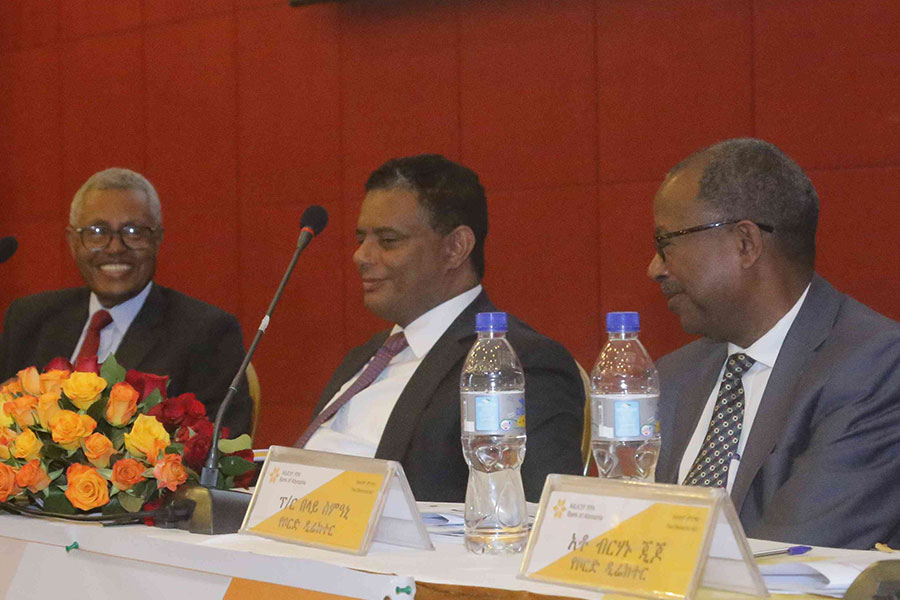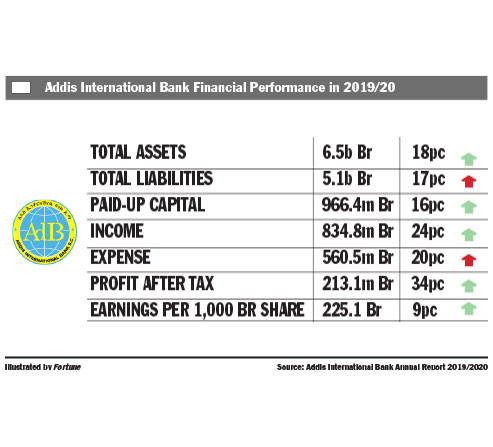
Agenda | Jun 05,2021
In a financial landscape beset with market uncertainty, Dashen Bank has registered a modest increase in net profits in its operations for 2022/23. While this marks a positive trajectory, the growth is notably less vigorous than the prior year's leap of 68.3pc.
The results, however, displayed an impressive net profit margin of 22.8pc, despite the deceleration in growth momentum. Posting a net profit of 3.56 billion Br, the Bank has witnessed significant income streams from fee-based and interest-related activities, posting a 43.9pc rise to 3.67 billion Br in the former and a 36pc increase to 13.41 billion Br in the latter.
These numbers mirror Dashen Bank executives' strategy to diversify revenue streams, extending beyond the conventional banking interest sources.
To consolidate its position in the industry, Dashen Bank has raised its paid-up capital to an impressive 9.3 billion Br, signalling a commitment to consolidate its market position. This is short by 2.7 billion Br of the paid-up capital shareholders have opted to mobilise by 2026, setting the stage for enhanced competitiveness. Dashen's asset base enlargement, coupled with a growing portfolio of loans and advances, hints at a robust growth trajectory and an ambitious expansion blueprint.
A keen observer of the banking landscape and financial analyst, Abdulmenan Mohammed (PhD), applauded Dashen’s performance for the year.
"The growth of the two income categories was impressive," he told Fortune.
Loans and advances (including interest-free financing) grew to 100.2 billion Br, representing an increase of 28.5pc.
However, this strategic choice could affect the return on equity if not offset by improved profit margins or more efficient use of assets, analysts caution. It has resulted in a notable drop in earnings per share (EPS). While the figure remains competitive within the banking industry, EPS dipped by 90 Br to 442 Br, denoting a potential area of concern for shareholders.
In the words of Dashen Bank's President, Asfaw Alemu, raising paid capital was the reason for the fall in share earnings.
Dashen Bank has expanded its loan portfolio by 28.5pc, indicating its aggressive credit growth strategy to capture more market share. This move aligns with the Bank's President strategy. He emphasised enhancing customer service to improve retention and remain competitive - responding to shareholders' service quality concerns.
The Bank's administrative expenses have ballooned, partly due to the opening of 253 new branches - an expansion that contributes to its infrastructural development but poses a challenge in maintaining profitability, especially under the spectre of inflation.
Asfaw's remarks about the role of inflation in driving up operating expenses highlighted the macroeconomic challenges the banking industry faces. With inflation, the cost of maintaining a widespread branch network and staffing it adequately can escalate quickly. Managing these costs without compromising service quality will be a crucial test for Dashen's management, according to Abdulmenan.
"Management of cost to income ratio is part of our new strategy," Asfaw told Fortune.
The Bank's dealings with foreign assets and liabilities have been a delicate one. Analysts see the ebb and flow of net foreign assets reflecting more than mere balance sheet entries — they serve as a barometer for Dashen's susceptibility to the whims of foreign exchange volatilities, a crucial point for business associates with an eye on international exposure.
The Bank's foreign exchange operations have faced a downturn, a pressing issue in the face of the forex crunch the economy experienced in recent years. In the wake of decreasing forex income, the management focuses on operational efficiency, a necessary shift as Asfaw and his team reassessed the forex management in anticipation of strategic shifts. He disclosed that strategic management of forex allotments is crucial in mitigating losses.
Running Dashen since 2018, Asfaw signalled ongoing initiatives to prepare for increased competition. He is an economics and policy management graduate from the University of Ghana with stints at the Development Bank of Ethiopia (DBE), Unity University and Wagagen Bank where he amassed diverse experience for three decades. For the past 19 years, he managed the corporate planning and credit departments of Dashen Bank before assuming his presidency.
Under his management, Dashen Bank has seen lending activities expand and a steady increase in interest on loans and advances. Since its incorporation in 1995, with a paid-up capital of 14.9 million Br raised from 11 shareholders, Dashen Bank has grown to enlist 2,600 shareholders, who met at the Skylight Hotel on October 26, 2023.
Despite earnings per share dropping, these shareholders have continued to raise their voices over customer service issues alongside financial outcomes.
Neguse Changue, a shareholder for five years with 800 shares, expressed a slight disappointment in the decline of EPS from the year before. His frustration with the customer service across branches and the head office was more apparent.
"They've to improve service to retain customers," he told Fortune.
Branch managers, such as Tiruneh Getahun, operating in the Mexico Square area, attest to the Bank's performance as commendable even in the face of market uncertainties.
"We're facing challenges in acquiring new clients," Tiruneh told Fortune, recognising that transactions between accounts have decreased across the financial sector while his branch is largely spared from the problem.
He attributed this partly to the customers visiting the Ethiopian Commodities Exchange (ECX) sharing the same space with the Bank.
However, forex income has halved, and Dashen's impairment losses have increased — a trend that has caught the attention of financial analysts. Keeping up with a continued four-year decline, Dashen's foreign exchange earnings had fallen by almost half from 681.22 the previous year. Financial analyst Abdulmenan believes the size of the loss should be a concern to the Bank's executives.
"We’re managing the forex allotment to reduce losses," the President told Fortune, acknowledging that more work will be necessary to deal with the declining forex income in the long run.
Operational expenses, which surged by 82.7pc to 2.96 billion Br, are a concern, amplified by a 58.6pc salary hike to 4.74 billion Br. The rise in loan impairments has been partly ascribed to loans disbursed in the Tigray Regional State, while the salary increases relate to the branch network's expansion.
Dula Mekonen, chairman of the Board, has recognised the Bank's growth despite the emergence of digital and traditional competitors and the influence of mandatory treasury bond purchases on credit operations. The Bank's capital adequacy ratio, an indicator of financial stability, remains robust. Standing well above the regulatory minimum, it reflects Dashen's healthy capital reserve, essential for absorbing potential losses and sustaining confidence among depositors and shareholders.
Abdulmenan, however, stressed the importance of prudent management in light of the Bank's liquidity and capital adequacy ratios, which currently exceed regulatory requirements.
In the face of these challenges, Dashen Bank's executives say they are not relying on the traditional growth levers of branch expansion and capital build-up but are equally prioritising operational efficiency and service quality. The Bank has embraced a comprehensive growth strategy, leveraging its expanded branch network to deepen customer relationships and increase its market presence.
The Chairman, Dula, encapsulated this sentiment by recognising the Bank’s performance against a backdrop of considerable economic and regulatory shifts.
The digital realm is another front where Dashen is aggressively marking its territory. Confronting digital disruptors head-on, Dashen Bank says it is improving digital service offerings, reinforcing its adaptability in a rapidly evolving financial sector.
According to the President, operational efficiency has become a critical issue for the Bank’s leadership.
"We're working to improve customer service culture," Asfaw told Fortune.
With administrative expenses taking an upward trajectory, particularly in the wake of inflationary pressures, there is a push towards streamlining operations. The Bank’s leadership is tasked with the delicate balance of expanding its reach while also maintaining a tight rein on costs — a balance that is essential for sustainable growth, according to Abdulmenan.
Financial analysts like him keep a keen eye on the Bank’s financial health indicators.
Dashen Bank’s strong liquidity position suggests a buffer against short-term shocks. Yet, the increase in loan impairments serves as a cautious reminder of the need for stringent credit risk assessment and management — Dashen increased losses on impairment of loans and other assets to 601.14 million Br from 270.09 million Br.
As one of the first-generation private financial institutions, Dashen Bank has navigated the choppy waters of liquidity with a measure of finesse, evidenced by its relatively high liquidity ratio of 19.6pc in the first quarter of 2020/21. However, recent figures suggest a contraction to 14.6pc by the fourth quarter of 2022/23, signalling a tightening of the Bank's liquid assets relative to its liabilities or a swelling of the latter.
Despite these shifts, Dashen has maintained a commendable adherence to the regulatory reserve mandates, occasionally buffering these with a surplus, demonstrating a conservative approach to liquidity management that may resonate with risk-averse shareholders. The constancy in the deposit turnover ratio hovers around 60pc, showing a steady tempo in the Bank’s operational cycles, wherein deposit inflows and outflows are balanced — a demonstration of the Bank’s operational knack in managing depositor funds for lending and investment undertakings.
Dashen's executives walk a tightrope balancing loan-to-deposit, striving for profitable lending that boosts earnings while sidestepping the pitfalls of overexposure that could sour in less favourable economic climates. The Bank mobilised deposits of over 114 billion Br, an increase of 25.9pc from last year. However, it is contending with liquidity and credit risks, with a loan-to-deposit ratio of 87.2pc, calling for rigorous risk management prudence.
Compliance with reserve requirements has been a feather in Dashen's cap, pointing to a disciplined fiscal position within the requirement set by central bank regulators. Occasionally, the Bank's positioning well above the minimum reserve threshold shows a prudent, if not cautious, risk outlook, analysts say.
PUBLISHED ON
Nov 04,2023 [ VOL
24 , NO
1227]

Agenda | Jun 05,2021

Fortune News | Jul 11,2021

Fortune News | Nov 07,2020

Fortune News | Mar 16,2019

Radar | Feb 17,2024

Radar | Jul 21,2024

Fortune News | Dec 17,2022

Fortune News | Apr 03,2021

Radar | Dec 21,2019

Radar | Jun 04,2022

Dec 22 , 2024 . By TIZITA SHEWAFERAW
Charged with transforming colossal state-owned enterprises into modern and competitiv...

Aug 18 , 2024 . By AKSAH ITALO
Although predictable Yonas Zerihun's job in the ride-hailing service is not immune to...

Jul 28 , 2024 . By TIZITA SHEWAFERAW
Unhabitual, perhaps too many, Samuel Gebreyohannes, 38, used to occasionally enjoy a couple of beers at breakfast. However, he recently swit...

Jul 13 , 2024 . By AKSAH ITALO
Investors who rely on tractors, trucks, and field vehicles for commuting, transporting commodities, and f...

Jul 5 , 2025
Six years ago, Ethiopia was the darling of international liberal commentators. A year...

Jun 28 , 2025
Meseret Damtie, the assertive auditor general, has never been shy about naming names...

Jun 21 , 2025
A well-worn adage says, “Budget is not destiny, but it is direction.” Examining t...

Jun 14 , 2025
Yet again, the Horn of Africa is bracing for trouble. A region already frayed by wars...